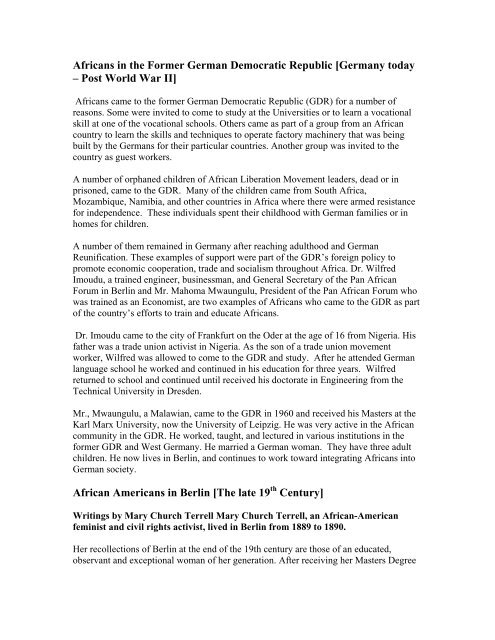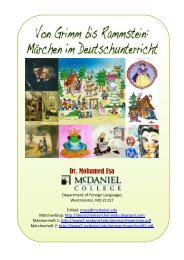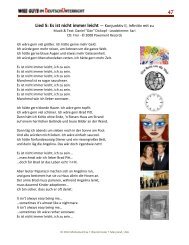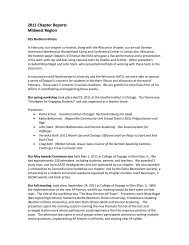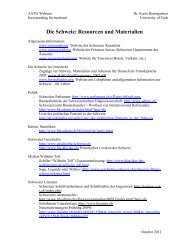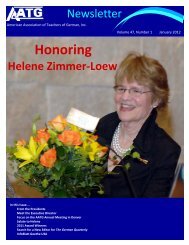Brief history of Africans in Germany Introduction - American ...
Brief history of Africans in Germany Introduction - American ...
Brief history of Africans in Germany Introduction - American ...
Sie wollen auch ein ePaper? Erhöhen Sie die Reichweite Ihrer Titel.
YUMPU macht aus Druck-PDFs automatisch weboptimierte ePaper, die Google liebt.
<strong>Africans</strong> <strong>in</strong> the Former German Democratic Republic [<strong>Germany</strong> today<br />
– Post World War II]<br />
<strong>Africans</strong> came to the former German Democratic Republic (GDR) for a number <strong>of</strong><br />
reasons. Some were <strong>in</strong>vited to come to study at the Universities or to learn a vocational<br />
skill at one <strong>of</strong> the vocational schools. Others came as part <strong>of</strong> a group from an African<br />
country to learn the skills and techniques to operate factory mach<strong>in</strong>ery that was be<strong>in</strong>g<br />
built by the Germans for their particular countries. Another group was <strong>in</strong>vited to the<br />
country as guest workers.<br />
A number <strong>of</strong> orphaned children <strong>of</strong> African Liberation Movement leaders, dead or <strong>in</strong><br />
prisoned, came to the GDR. Many <strong>of</strong> the children came from South Africa,<br />
Mozambique, Namibia, and other countries <strong>in</strong> Africa where there were armed resistance<br />
for <strong>in</strong>dependence. These <strong>in</strong>dividuals spent their childhood with German families or <strong>in</strong><br />
homes for children.<br />
A number <strong>of</strong> them rema<strong>in</strong>ed <strong>in</strong> <strong>Germany</strong> after reach<strong>in</strong>g adulthood and German<br />
Reunification. These examples <strong>of</strong> support were part <strong>of</strong> the GDR’s foreign policy to<br />
promote economic cooperation, trade and socialism throughout Africa. Dr. Wilfred<br />
Imoudu, a tra<strong>in</strong>ed eng<strong>in</strong>eer, bus<strong>in</strong>essman, and General Secretary <strong>of</strong> the Pan African<br />
Forum <strong>in</strong> Berl<strong>in</strong> and Mr. Mahoma Mwaungulu, President <strong>of</strong> the Pan African Forum who<br />
was tra<strong>in</strong>ed as an Economist, are two examples <strong>of</strong> <strong>Africans</strong> who came to the GDR as part<br />
<strong>of</strong> the country’s efforts to tra<strong>in</strong> and educate <strong>Africans</strong>.<br />
Dr. Imoudu came to the city <strong>of</strong> Frankfurt on the Oder at the age <strong>of</strong> 16 from Nigeria. His<br />
father was a trade union activist <strong>in</strong> Nigeria. As the son <strong>of</strong> a trade union movement<br />
worker, Wilfred was allowed to come to the GDR and study. After he attended German<br />
language school he worked and cont<strong>in</strong>ued <strong>in</strong> his education for three years. Wilfred<br />
returned to school and cont<strong>in</strong>ued until received his doctorate <strong>in</strong> Eng<strong>in</strong>eer<strong>in</strong>g from the<br />
Technical University <strong>in</strong> Dresden.<br />
Mr., Mwaungulu, a Malawian, came to the GDR <strong>in</strong> 1960 and received his Masters at the<br />
Karl Marx University, now the University <strong>of</strong> Leipzig. He was very active <strong>in</strong> the African<br />
community <strong>in</strong> the GDR. He worked, taught, and lectured <strong>in</strong> various <strong>in</strong>stitutions <strong>in</strong> the<br />
former GDR and West <strong>Germany</strong>. He married a German woman. They have three adult<br />
children. He now lives <strong>in</strong> Berl<strong>in</strong>, and cont<strong>in</strong>ues to work toward <strong>in</strong>tegrat<strong>in</strong>g <strong>Africans</strong> <strong>in</strong>to<br />
German society.<br />
African <strong>American</strong>s <strong>in</strong> Berl<strong>in</strong> [The late 19 th Century]<br />
Writ<strong>in</strong>gs by Mary Church Terrell Mary Church Terrell, an African-<strong>American</strong><br />
fem<strong>in</strong>ist and civil rights activist, lived <strong>in</strong> Berl<strong>in</strong> from 1889 to 1890.<br />
Her recollections <strong>of</strong> Berl<strong>in</strong> at the end <strong>of</strong> the 19th century are those <strong>of</strong> an educated,<br />
observant and exceptional woman <strong>of</strong> her generation. After receiv<strong>in</strong>g her Masters Degree


